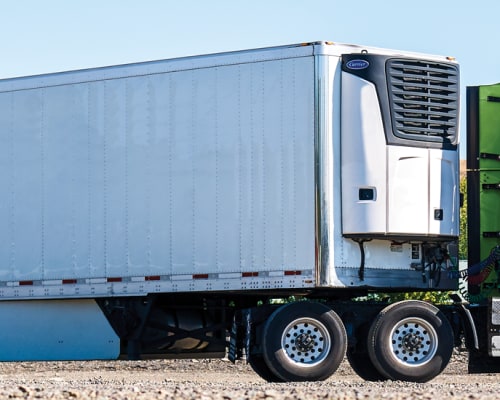Comprehensive Guide to Leading Transport Refrigeration Companies
Comprehensive Guide to Leading Transport Refrigeration Companies
Blog Article
A Thorough Overview of the Mechanisms Behind Refrigerated Truck Transportation and Its Duty in Food Safety And Security
Chilled vehicle transportation is vital in keeping food security, utilizing sophisticated temperature level control systems and insulation technologies to protect perishable goods throughout transportation. The combination of advanced surveillance systems makes sure real-time oversight, permitting immediate treatment in case of temperature deviations. These essential aspects not only maintain the stability of food yet likewise play a vital duty in avoiding foodborne illnesses. Recognizing how these devices work with each other raises vital concerns concerning their efficiency and possible areas for enhancement within the industry. What ramifications do these variables have for the future of food safety?
Value of Refrigerated Transportation
Refrigerated transport plays a crucial role in preserving the honesty and safety of disposable items throughout the supply chain (transport refrigeration). This specific logistics system is necessary for maintaining the quality of foodstuff, consisting of fresh fruit and vegetables, dairy items, meats, and seafood, which are at risk to spoilage when revealed to temperature level variations. The capability to preserve a regular and controlled atmosphere makes sure that these items preserve their dietary value, taste, and safety and security for customers
In addition, chilled transportation decreases the threats of foodborne ailments, which can emerge from the development of unsafe microorganisms in poorly kept products. By adhering to stringent temperature requirements, businesses not only adhere to governing criteria however likewise foster consumer trust fund and brand name dependability. The economic implications are substantial; lowered wasting rates convert to reduced losses for vendors and sellers, adding to overall profitability.
In addition, the boosting worldwide need for fresh and high-quality food items even more stresses the value of refrigerated transportation. As supply chains become extra complicated and extend globally, the need for reliable temperature-controlled logistics remains to expand, underpinning the entire food circulation network and making sure that perishable items reach their locations safely and successfully.
Temperature Control Devices
Maintaining ideal temperature level control is important in the transportation of disposable items, and a variety of systems are used to achieve this objective. Refrigerated vehicles make use of advanced refrigeration systems, largely using vapor compression modern technology, which circulates cooling agent via evaporator and condenser coils to extract warm from the freight location. This procedure ensures that the interior stays consistently cool, thereby protecting the top quality and safety of the products being delivered.
In addition, vehicles are equipped with temperature tracking systems that supply real-time information on the inner environment. These systems typically consist of electronic sensing units and alarm systems to sharp operators in case of temperature changes, allowing instant restorative activities. Some cooled vehicles likewise feature programmable temperature settings, enabling accurate control tailored to particular types of cargo, such as vegetables, fruits, or pharmaceuticals.
In addition, the usage of pre-cooling strategies prior to packing improves the efficiency of temperature level control. By reducing the cargo area's temperature prior to the intro of items, the threat of temperature level spikes throughout transportation is decreased. These devices jointly add to a dependable chilly chain, crucial for keeping the honesty and safety and security of subject to spoiling food things throughout the transport procedure.
Insulation Technologies
Insulation modern technologies play an important duty in enhancing the performance of cooled vehicle transport by decreasing thermal exchange between the freight location and the exterior setting. Effective insulation is important for preserving the called for temperature for subject to spoiling goods, thereby guaranteeing food security and high quality throughout transportation.
Usual insulation materials used in chilled trucks consist of polyurethane foam, polystyrene, and fiberglass, each supplying varying levels of thermal resistance. Polyurethane foam, understood for its superior insulating buildings, is frequently used as stiff panels that can be molded to fit the truck's interior. Polystyrene offers a light-weight choice while still giving ample thermal defense. Fiberglass, although much less typical, can be effective in certain applications as a result of its durability and resistance to moisture.

Advanced Tracking Systems
To ensure the honesty of disposable products during transportation, advanced monitoring systems have actually become a pivotal technology in the cooled vehicle market - refrigerated truck companies. These systems utilize a mix of sensors, data loggers, and real-time tracking modern technologies to constantly monitor temperature level, moisture, and total freight problems throughout the trip. By supplying instantaneous feedback on environmental variables, these systems allow for her response punctual corrective activities, therefore protecting item quality
Modern monitoring systems are furnished with cordless connectivity, making it possible for seamless data transmission to logistical centers and stakeholders. This connection facilitates remote tracking, which is essential for preserving conformity with industry policies and criteria. Alerts can be generated in real-time, notifying drivers of any kind of deviations from pre-set limits, hence minimizing the danger of wasting.
In addition, the integration of sophisticated analytics and equipment learning algorithms improves predictive abilities, enabling better planning and danger analysis. Historic information gathered from these systems can educate future transport methods, maximizing routes and minimizing possible threats. In general, the release of innovative monitoring systems represents a considerable innovation in the chilled transport sector, reinforcing the commitment to protecting the high quality and security of disposable items throughout their trip.
Influence On Food Security Standards
The combination of innovative surveillance systems in refrigerated vehicle transportation has actually dramatically affected food safety and security criteria throughout the supply chain. These systems allow real-time tracking of temperature, moisture, and various other critical parameters vital for preserving the integrity of subject to spoiling items. By making sure that products remain within defined temperature ranges throughout transportation, these technologies mitigate the threat of microbial development and putridity, which are critical in food safety and security.

The fostering of information analytics also allows for aggressive decision-making, allowing business to identify potential problems before they rise into food safety offenses. Therefore, the consolidation of advanced tracking systems not only boosts operational performance however also cultivates greater liability in the food supply chain. This development underscores the critical duty of innovation in boosting food security criteria and guaranteeing customer confidence in the items they receive.
Verdict
In final thought, chilled truck transportation is necessary for maintaining food safety and security with reliable temperature control, progressed insulation innovations, and continuous tracking systems. These devices work synergistically to preserve the high quality of perishable items and read review reduce the danger of foodborne ailments. Adherence to stringent food security standards is attained through the execution of these technologies, highlighting the critical function of refrigerated transport in the food supply chain and its influence on public health and wellness.
Refrigerated vehicle transport is crucial in preserving food security, employing sophisticated temperature control devices and insulation modern technologies to protect subject to spoiling goods throughout transportation - transport refrigeration. Proper maintenance of insulation stability, consisting of routine checks for wear or damages, is additionally necessary to endure the performance of cooled transport systems and guarantee compliance with food security policies
The combination of sophisticated monitoring systems in refrigerated truck transport has substantially influenced food safety standards across the supply chain.In verdict, chilled vehicle transport is important for maintaining food safety via reliable temperature control, advanced insulation technologies, and continual tracking systems. Adherence Visit This Link to strict food safety criteria is accomplished through the implementation of these modern technologies, highlighting the important function of refrigerated transportation in the food supply chain and its effect on public health.
Report this page